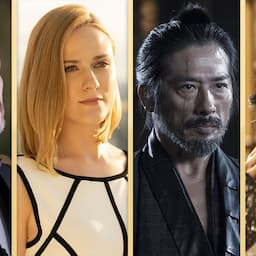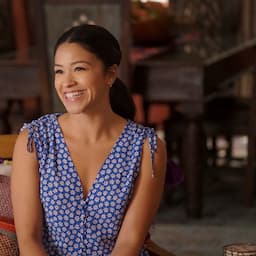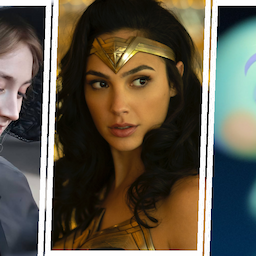Talking 'Kajillionaire' with writer-director-visionary Miranda July.
Miranda July's Kajillionaire, as with all of her work, is a kiss-your-brain, truly original and wholly her film -- and unlike anything you've seen before. The visionary director's first feature in nearly a decade, Kajillionaire is a heist film about the cult-like nature of family that follows a character named Old Dolio (played by Evan Rachel Wood) as she embarks on a series of low-stakes grifts with her parents (Richard Jenkins and Debra Winger).
The con-family will go to any lengths just to skim by, something that earned Kajillionaire raves when it premiered at Sundance earlier this year but takes on a new meaning now in desperate times of our own. "It somehow was made for us now," July reflects. When an attractive outsider, Melanie (Gina Rodriguez), joins the scheming trio, Old Dolio's entire life is turned upside down.
"I feel like the foundation of this film is love," Rodriguez tells ET. "How we find it, seek it, desire it, long for it and seeing the way each character's relationship with love develops and evolves... You see that we all need that. We all need love, first and foremost."
"What's strange is a lot of these things are so relevant now especially in the time of COVID, because there's a lot about connection and physical touch and this need to connect and be seen," Wood added. "What drew me to the project was that I'd never read this script and that was such a rare thing in this age of remakes and franchises and sequels. It reminded me of the golden era of independent film, where there were these tragic comedies told through this artful medium that was slightly surreal but very much rooted in reality and real emotion."
ET got on the phone with July to discuss dreaming up her eccentric cast of characters, what went into Wood's Old Dolio transformation and casting her and Rodriguez as love interests.
You've said these characters in Kajillionaire came to you almost in a dream. There are so many layers here, though, with the cons, with themes of breaking free from familial dynamics and coming of age, there's a love story. How much does the rest of the movie come fully formed from your unconscious? Or how do you go about finding it along the way?
It's sort of like there's these islands that come from my unconscious without too much thought, like little gifts. And then I'm solving problems again and again. Like, "Well, how do we get from here to here?" Or, "Why would Melanie join them?" All these questions arise, and that, to me, is quite fun. It's like this sort of almost detective problem-solving work that is less about, "Let me just invent something," and more like, "Let me really figure out -- by looking at clues and what's already there -- what the actual truth is," as if it's prewritten somewhere. I don't know. That sounds a little corny, but I have to really believe that it's true to some degree.
You create the character of Old Dolio, and then you bring Evan Rachel Wood in. This is a very different character for her. What did you see in Evan that was right for Old Dolio? Or what was it that you saw in Old Dolio that you thought would bring out something new in Evan?
Evan is such a shapeshifter. I remember clawing through Google Image search trying to find pictures of her without makeup. Or [being] like, "Oh, look. She's wearing kind of a big shirt there." And then finally having dinner with her and still looking for some kind of signal -- because she's such a good actress that it's really hard to know, if it even matters, who is the real Evan. I maybe still don't know.
But I just needed her to indicate. And I remember, at one point, she said that Old Dolio really reminded her of Edward Scissorhands, and that she'd always related to Edward Scissorhands. That that was, like, in her soul, her favorite character in all of film history. I was like, "Well, first of all, that's a man and kind of a monstrous man." But that was just so telling to me, and she said that without flinching. No apology. Like, this was the truth. I think, from that moment on, I was very, very excited.
The voice is so distinct. What was the process of coming together to find that? And how did you know when you'd gotten Old Dolio's voice right?
That, I never would have been bold enough to ask an actor to do a different voice for a whole movie. Like, I'm just not that confident. [Laughs] But she suddenly dropped her voice down one day and said, "This is my natural register." Like, "This is my original voice. I got vocal nodes, so a vocal coach trained my voice up like this." It was a total trip to me. I was like, "Wait a sec. You're saying that other voice is the one you started out with? Do you think you could do that for the whole movie?" And she's like, "Oh, no problem." I was like, "Oh my goodness. Have you ever done this before for a movie?" This just seemed like free gold to me, and it also helped her drop down into Old Dolio instantly.
I also want to hear about how you thought through her look. In some ways, the outfit almost made me almost think of Billie Eilish in its oversizedness. But I was also talking to a friend who was saying that he thinks nonbinary people might embrace Old Dolio, that they could interpret Old Dolio on a journey to embracing a nonbinary identity.
I'm right there with both those things, actually. I was trying to give her something that Melanie could essentially misread as cool -- as, like Billie Eilish cool and butch, like long-haired butch or whatever -- but for Evan, had this kind of neutrality. She probably hadn't thought about it or certainly articulated it, but that it gave her room to do what she needed to do and was kind of open-ended.
There have been journalists who've said, "Oh, I thought that was a boy for a lot of the movie." And I kind of smile. Often these are very straight, older male journalists, but at the same time, I'm like, "Maybe you're not wrong." Like, we don't know. We don't know what her journey is afterwards. We're calling her "she," but I don't think she knows yet that she has options pronoun-wise. You know, my kid is nonbinary, and it's a little eerie. They were younger when I made this character, but sometimes I'm like, "This is kind of a trip." There's a sort of uncanny resonance there that just happened.
One of my unexpected delights of the movie is the relationship between Evan, or Old Dolio, and Gina's Melanie. Did you roll the dice on their chemistry? Or how did you know that would play?
I knew they both were bisexual. That was important to me, that they both had had relationships with women and that wasn't going to be some reach for them. I don't want to speak for them, but I would just say we had intimate conversations right off the bat. I remember with both of them, in our first meetings, talking about our intimacies that we'd had with women. I was a little surprised, to be honest, like, there was a lot more there already to work with than I had known. I didn't even get to work with Gina before we started shooting, because she was on another movie. She is the one character who joined a week in, so I definitely didn't do any, like, chemistry reads, but I just assumed they're both really hot. [Laughs] I don't know!
It's such a tender and strange and queer love story. It's romantic, but there is also this element of re-parenting at play in it. What were the conversations like with Evan and Gina about what you wanted to convey and how you wanted to convey it in that relationship?
I think by the time we got to the scenes where Gina's tenderness really comes out towards Old Dolio, we were shooting enough in chronological order that that was real. If you hung out with Richard and Debra being those parents for many days in a row, it's anxious. It's a whole deal that you're coping with each day. So, to get her finally alone, it was like the whole air shifted and there was suddenly room for this tremendous vulnerability on Evan's part, and on Gina's part, something much gentler.
She just really wanted to take care of her. We had literally done so much to get to that point and that they had kind of earned it. By the time we got to the scene where they could finally touch each other, like, they wanted to. I remember the first thing they did was really held each other, and I was like, "OK, you guys, that's not the scene." [Laughs] But at that point, there was a lot of longing there.
I read in your monograph that Carrie Brownstein connected you with Evan and Lena Dunham put you in touch with Gina. Had you decided on those two already and then you find a friend in common? Or do your friends come to you and say, "Miranda, you need to work with so and so"?
In the case of Gina, I had told Lena about the script early and told her about this beautiful Latina woman, and she was like, "Who will be Gina Rodriguez, right?" I was like, "Oh wow." And from that point on, I became obsessed with her and really began writing for her, and when the time came, I was like, "Please introduce us. I think the script is ready for her." And then in the case of Carrie, these are my real friends, so she's endured many casting conversations. I think there was a point where she was like, "Guess what. I know Evan. Like, I definitely can text her." That's why it's great for women to be in power! We can all have this girls club.
I think of you as someone who has always created on your own terms, so being creative in quarantine might not have been such a hurdle. I mean, you've done so much these past few months, but did you have any bumps in tapping into your creativity amid all this?
I think, like a lot of us, for the first few months I was like, "I'm doing OK. Look at me. I have a schedule, and it seems to be working." And now, when I look back at that time, I think, "You were in shock. You could barely form a sentence. Now, you are beginning to adjust." I mean, the future is so unknown that I have no idea what stage this is. This may still be the beginning. But in retrospect, it was quite hard, because the brain can only accommodate so much. At least my brain was just taken up by processing the shift in reality. It took a while to understand how to make things, logistically, and why and for whom. Is it for future people after the pandemic? Like, who are they? Who are we?
Through that process, have you learned anything new about yourself or your art or how you approach your art?
Yeah, often I feel almost slightly self-conscious about how scrappy I am. It's like somehow, I can't shake my punk roots. Even though I'm sitting here in the Four Seasons right now, I'm always thinking, "OK, I'm ready to ascend. Whatever the real world is, I'm ready to participate now." And this was going to be a big year for me in terms of these three different major things coming out, and then the whole hierarchy disintegrated. I didn't go to the Cannes Film Festival. That trip just didn't happen. And I think the odd thing was, for me -- and I've talked about this with some friends -- is that kind of agility that, for lack of a better word, is grassroots and community-based and definitely scrappy, that's actually serving us pretty well right now. And I think might have a lot to do with future survival, and not only in a Mad Max kind of post-apocalyptic way, but in a powerful way, in a, dare I say, sexy and important way.
Kajillionaire is in theaters Friday, Sept. 25.
RELATED CONTENT:


